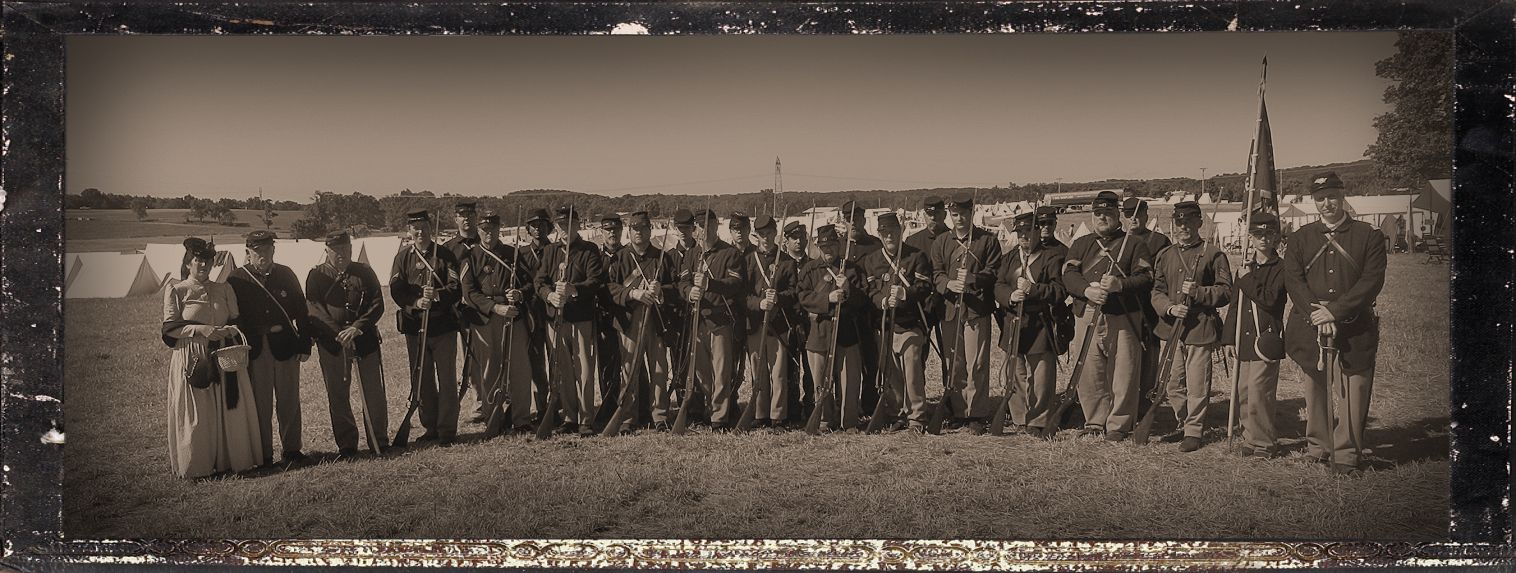

Civil War reenacting is described in a number of ways including living history and a hobby. While the recreation of Civil War military life does bring an interpretation of the past alive, I believe that Civil War reenacting is more profound than following a favorite athletic team, collecting stamps or restoring furniture. The reasons for involvement in Civil War reenacting appear as diverse as the personalities of individuals who volunteer their time to wear wool uniforms on hot summer days and sleep on the hard ground in remote fields serenaded by the flapping of canvas, neighing horses and crackling campfires. The following is a compilation of some of the reasons why inspired individuals decide to sacrifice their treasured time and serve as reenactors.
1. Connection to a past time period in American History and the positive values endorsed during the Victorian era in the United States (e.g. chivalry, respect for authority, loyalty, honor).
2. Rekindling of personal memories of family vacations to Civil War battlefields like Gettysburg or Antietam. Often these trips fostered on ongoing shared interest in Civil War history for parents and their children. The rosters of many Civil war reenactment regiments contain ample representation of families who joined because of their shared curiosity which deepened their bond.
3. Being part of a larger community of individuals united by a common interest who appreciate they are part of a phenomenon that is much larger than their own personal fascination with Civil War history.
4. Immersion in an activity featuring a unique set of clothing, rules and behavior which transports the individual into the past if even for a moment. For a fleeting instant, participants gain an appreciation of both mundane and powerful moments in the life of a Civil War soldier. This altered state can also be done for the enjoyment of the experience or an escape from present day stressors. Reenactors have the special opportunity to feel the bond that kept Civil War soldiers from retreating in fear when forming a battlefront while standing shoulder to shoulder so each soldier can fire a musket volley in unison at an approaching line of enemy soldiers who extend well across the horizon. Reenactors gain an appreciation of personal sacrifice when he or she elects to leave the warmth of their dog tent to tend a faltering campfire without the aid of lighter fluid in the brisk early morning hours for members of their company.
5. Preservation of the hallowed ground of battlefield locations throughout the United States and Civil War relics especially battle flags which led soldiers into battle. Many find that the retracing of the steps of soldiers at Civil War battlegrounds to be an important pilgrimage which honors the sacrifices of American soldiers who lived over 150 years ago. One cannot help but marvel at the courage of those soldiers who marched the long mile journey through the undulating fields of Pickett’s Charge from Seminary Ridge to Cemetery Ridge in Gettysburg and those 6,500 Union soldiers who steadfastly stood their ground as 15,000 yelling Rebels approached the high water mark of the Confederacy.
6. Safeguarding for future generations our knowledge of material culture including uniforms, weapons, and accouterments as well as Civil War tactics and codes of conduct.
7. Fondness and respect for military culture, standards and discipline.
8. Intellectual stimulation provided by the thousands of books that have been published about the Civil War and historical records including a wealth of primary source information about Civil War units (regiments, corps) and soldiers (privates, NCOs, officers). Most reenactors, however, find that other reenactors are the best source for new information about the Civil War.
9. Representation and honoring of ancestors who fought in the Civil War. This includes families of the nearly 3 million Americans who fought for the Union or Confederate armies.
10. Educating children and adults about the life of a Civil War soldier and how our country was forever changed as a result of this struggle for freedom. It is indeed for us the living, rather, to be dedicated here to the unfinished work which they who fought here have thus far so nobly advanced.
11. Expression of individuality. For many reenacting publicly affirms an interest in military history which no longer is popular in contemporary culture or in school curriculums. Some reenactors simply enjoy the attention they receive from spectators while other want others to notice their act of rebellion in the face of conformity.
12. Devotion to Patriotism. Most importantly, Civil War history is about the history of the United States of America! As reenactors we honor the many brave soldiers who served and the estimated 600 - 700 thousand who gave the last full measure of devotion -- that we here highly resolve that these dead shall not have died in vain -- that this nation, under God, shall have a new birth of freedom -- and that government of the people, by the people, for the people, shall not perish from the earth.